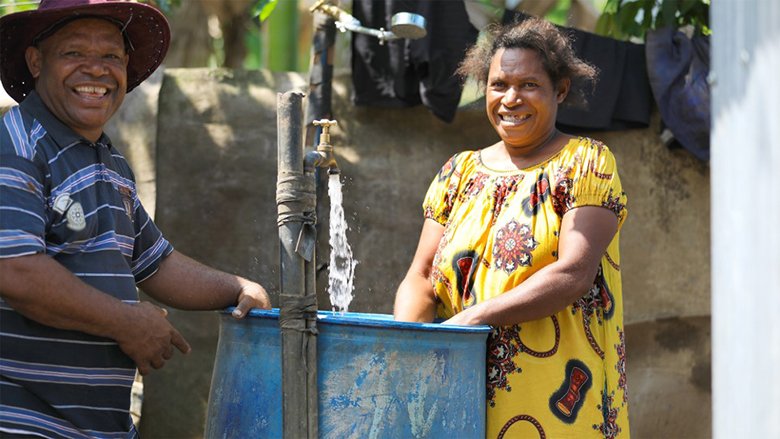At a population of over 2.1 billion, rapid urbanization and growing business demands are creating a need for more investment in infrastructure, sustainable sanitation and reduction and management of marine plastic pollution in East Asia and Pacific.
The region is also prone to rising sea levels which are threatening coastal areas, and bears the brunt of 70% of the world’s natural disasters and other effects of climate change. Increased climate variability, land degradation and water stress are compounding factors for loss of livelihoods, conflicts, and displacement.
Strengthening Support Through Partnerships
With support from the Australian Department of Foreign Affairs and Trade (DFAT) and other donors’ support through the Global Water Security and Sanitation Partnership (GWSP), the World Bank has substantially grown its water program in the Pacific region over the last five years. Water projects in the Pacific include projects in Solomon Islands, Timor Leste (as well as a dedicated projects in the capital Dili), together with water and sanitation projects in Kiribati.
These projects are transforming communities and changing lives by delivering access to clean and reliable water supply services for thousands of people in remote rural areas. In Papua New Guinea (PNG), one of the most in-need countries in the region, where the majority of the population live without access to a fresh, consistent water supply and sanitation, GWSP has supported the adoption of the country’s first national WASH policy, which came into effect in 2015. This includes assessment of risks associated with water resource selection, including climate change impacts and anthropic pressure. The outcomes of this assessment have a direct impact on the quality and implementation of the US$70 million World Bank financed project, the goal of which is to increase access to water supply services in six key towns across the country.
One of those towns is Bialla, home to more than 13,000 people, located in PNG’s West New Britain Province, relatively close to the now-dormant Mount Ulawun, known to have been one of the most hazardous volcanoes in the world.
The lack of access to clean water was a constant struggle for the people living in Bialla.
“Because there was no water, our children didn’t go to school. Their uniforms were unwashed, and we couldn’t cook their food, so we didn’t send them to school. That was the way of life,” said Monica Tum, a mother and local market vendor.
Through the Water PNG and World Bank-funded Water Supply and Sanitation Development Project which is supported by GWSP and implemented by the government of Papua New Guinea, families like Monica’s now have the much-needed clean water to live healthier lives.
For Monica, having access to safe water means she is now able to better take care of her family.
“Our kitchen utensils and laundry now have water to wash and clean these things. My children go to school every day. I can wash their clothes now and cook every day for them.”
The support from DFAT and other donors, channeled through GWSP, has also meant an increase in World Bank water staff in the Pacific region. This in-country presence means World Bank water experts are engaging constantly with government counterparts, while also supporting the growing number of water projects. Today, there are specialist water and sanitation staff located in Suva (Fiji), Port Moresby (PNG) Dili (Timor Leste) and Sydney (Australia) who are all working to support countries deliver better water and sanitation to their citizens.
How Global Water Security and Sanitation Partnership Works
A multi-donor trust fund administered by the World Bank’s Water Global Practice, the Global Water Security and Sanitation Partnership is supported by 10 donor partners including Austrian Ministry of Finance, Ministry of Foreign Affairs of Denmark, Australia’s Department of Foreign Affairs and Trade, Netherlands’ Ministry of Foreign Trade and Development Cooperation, Bill and Melinda Gates Foundation, Switzerland’s State Secretariat for Economic Affairs, Spanish Ministry of Economic Affairs and Digital Transformation, Swiss Agency for Development and Cooperation, United States Agency for International Development and Swedish International Development Cooperation Agency.
GWSP is providing analytical support, which is enabling the World Bank to inform policy, improve project design, and increase its program in the Pacific region - both with more staff and more funding. An example a GWSP-funded study on water and sanitation service delivery options for settlement communities in Solomon Islands’ capital, Honiara. The study’s results have informed water, sanitation and hygiene investments under the Solomon Islands Urban Water Supply and Sanitation Sector Project (UWSSSP). Following on from this study, UWSSSP has collected further baseline survey information to inform the next states of hygiene promotion and WASH in schools.
In 2018, GWSP provided assistance in Kiribati through a study on Building Urban Water Resilience in Small Island Countries which was critical to designing water and sanitation projects in South Tarawa. In 2021, the Partnership also provided technical recommendations for the South Tarawa 2010 Sanitation Roadmap to the New Zealand Ministry of Foreign Affairs and Trade which will be used as guidelines on investments and reforms in the sanitation sector for the next 20 years.
It is important to make water security and sanitation in the Pacific region, a development priority and strong partnerships can help achieve this goal.
